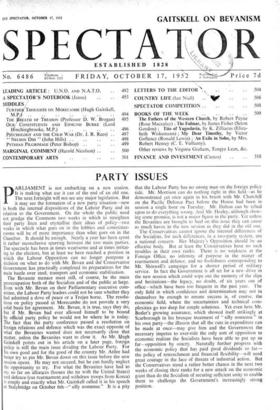PARTY ISSUES
The Bevanite menace must still, of course, be the main preoccupation both of the Socialists and of the public at large. Even with Mr. Bevan on their Parliamentary executive com- mittee, the Labour Party leaders could not be sure whether they had admitted a dove of peace or a Trojan horse. The resolu- tions on policy passed at Morecambe do not provide a very solid basis for agreement. Mr. Bevan, it is true, says they do, but if Mr. Bevan had ever allowed himself to be bound by official party policy he would not be where he is today. The fact that the party conference passed a resolution on foreign relations and defence which was the exact opposite of what the Bevanites wanted does not necessarily close that matter, unless the Bevanites want to close it. As Mr. Hugh Gaitskell points out in his article on a later page, foreign policy is still the main issue dividing the Labour Party. For his own good and for the good of the country Mr. Attlee had better try to pin Mr. Bevan down on this issue before the new session opens. He may not succeed, but he can hardly neglect the opportunity to try. For what the Bevanites have had to say so far on alliances (loosen the tie with the United States) and defence (cut rearmament and withdraw troops from Korea) Is simply and exactly what Mr. Gaitskell called it in his speech at Stalybridge on October 6th—" silly nonsense." It is a pity that the Labour Party has no strong man on the foreign policy side. Mr. Morrison can do nothing right in this field—as he demonstrated yet once again in his brush with Mr. Churchill on the Pacific Defence Pact before the House had been in session a single hour on Tuesday. Mr. Dalton can be relied upon to do everything wrong. And Mr. Healey, although show- ing some promise, is not a major figure in the party. Yet unless the Bevanites are brought to heel on this issue they can cause as much havoc in the new session as they did in the old one.
The Conservatives cannot ignore the internal differences of the Socialists, for such differences, in a two-party system, are a national concern. Her Majesty's Opposition should be an effective body. But at least the Conservatives have no such troubles in their own ranks. There is no weakness at the Foreign Office, no infirmity of purpose in the matter of rearmament and defence, and no foolishness corresponding to Mr. Shinwell's campaign for a shorter period of military service. In fact the Government is all set for a new drive in the new session which could wipe out the memory of the slips and hesitations—the legacy, no doubt, of six years out of office—which have been too frequent in the past year. The only field in which confidence and determination may not in themselves be enough to ensure success is, of course, the economic field, where the uncertainties and technical com- plexities go too deep for simple solutions. Yet even here Mr. Butler's growing assurance, which showed itself strikingly at Scarborough in his brusque treatment of " silly nonsense " in his own party—the illusion that all the cuts in expenditure can be made at once—may give him and the Government the necessary impetus to over-ride the only sort of opposition to economic realism the Socialists have been able to put up so far—opposition by outcry. Naturally further progress with the economic policy that has paid good dividends so far— the policy of retrenchment and financial flexibility—will need great courage in the face of threats of industrial action. But the Conservatives stand a rather better chance in the next two weeks of closing their ranks for a new attack on the economic giant than do the Socialists of securing sufficient unity to enable them to challenge the Government's increasingly strong position.


































